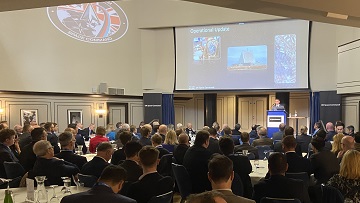
Overview
The inaugural ADS Defence Space Seminar took place on Wednesday 30th March 2022. This event promoted and encouraged engagement between the UK’s defence and space sectors, and UK Space Command. The event provided an important platform for dialogue after the release of the Defence Space Strategy in February 2022. The event was attended by two hundred industry and government representatives, enabling them to learn, discuss, collaborate and network with their peers.
Speakers and presentations
A diverse range of presenters including Air Vice Marshal (AVM) Harv Smyth, Space Directorate; AVM Paul Godfrey, Space Command; Dr Roger Tidswell, UK Defence Solutions Centre (UKDSC); and Dr Matthew Broadhead, Defence Science and Technology Laboratory (DSTL).
The talks covered the future of defence in space, exploring what the UK Space Command is doing to contribute to this, with a breakdown of the recently announced Defence Space Portfolio, which will deliver capability in a range of areas from Space Domain awareness to Space Based Intelligence, Surveillance and Reconnaissance.
- Titania, a high-speed free space optical communication link.
- CIRCE, a joint venture between DSTL and US NRL to advance Space weather measurement and modelling capability.
- Oberon, a high-performance Synthetic Aperture Radar(SAR) cluster.
With space being a ‘congested and contested’ environment, many potential space threats were identified from non-kinetic effects and electronic warfare through to kinetic attacks. There was also some discussion about the key actors who are present and who will emerge that may endeavour to deny our space capabilities, with explicit acknowledgement of Russia and China.
There was attention paid also to collaboration with Five Eyes allies and NATO partners to accelerate progress, employee development & hiring talent, and sustaining a mutually beneficial relationship with industry.
Afternoon Industry discussion sessions
During this part of the event insights, issues and challenges were shared between industry and government. Four discussion sessions took place and the following provides a brief overview:
Building and sustaining a mutually beneficial relationship with industry
- Representatives from different companies seemed to say many different things, but on most points that advanced, there was consensus throughout the room.
- Comparisons were made between US and UK procurement processes and how the UK can adopt a similar approach to benefit industry.
- Filtering information and providing transparency to SMEs was emphasised.
Maximising our Space workforce talent
- This discussion showed that there were challenges recruiting young talent into the industry.
- There was attention to promoting secondments and their usefulness.
The space contribution to UK Defence’s Multi-Domain Integration (MDI)
- There was still some confusion amongst Industry as to whether MDI was a technology or cultural change programme, or a mixture of both
- This session explored whether space should be the lead Front Line Command (FLC) in MDI. MDI is not just about integration across the five domains within defence. It also includes other government departments, industry, and allies/partners. Space could be a great example of MDI to the rest of Defence on how to bring all these aspects together.
- The role of OneWeb in MDI, following the Government’s £400m investment.
- There was a view that the ground segment is often an afterthought to space systems but is the heart of MDI. Unless this is started at the same time as, or before, the satellites then it becomes a big challenge.
Accelerating and improving the acquisition process for Space capability
- There was consensus throughout the room that MOD could do more to improve the acquisition process.
- An MOD rep talked about how there was limited wiggle room due to legislation. Rather, they suggested that industry ‘inject pace’ into the process.
- The Serapis framework was posed to be the main procurement vehicle for Space Command.
Overall, the seminar provided a nice insight into the space sector where concepts to complications were shared openly and in detail. Special thanks to the event sponsors Barrier Networks, Cadence, Raytheon UK, Spire Global, and the Space Alliance.





